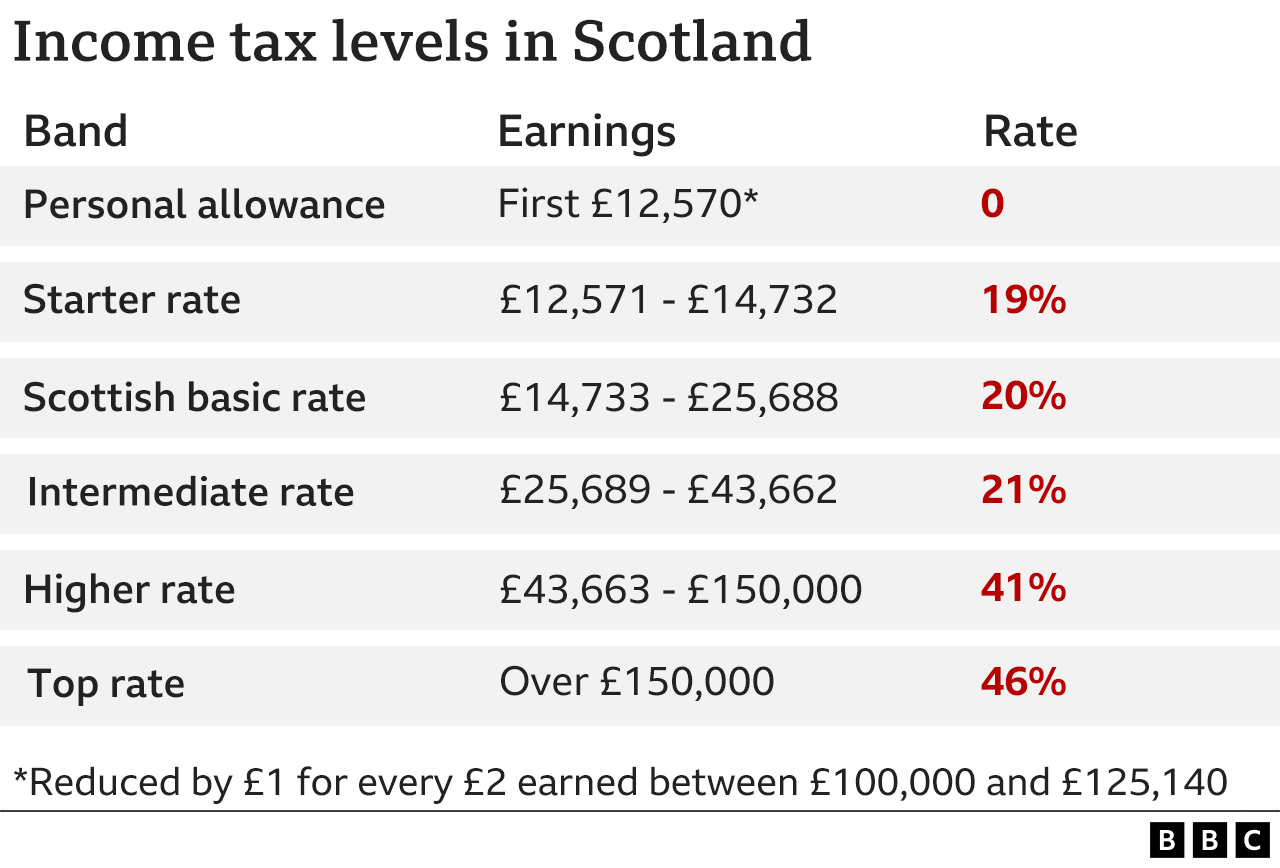 Getty Images
Getty ImagesWhen Chancellor Jeremy Hunt delivers his Autumn Statement, he is likely to announce tens of billions of pounds worth of spending cuts and tax rises.
But some of the changes will not apply in Scotland, as some tax-raising and social security powers have been devolved to the Scottish Parliament.
The Scottish government’s tax and spending plans for 2023/24 are due to be published on 15 December.
How much of Mr Hunt’s statement will apply in Scotland?
Your wage slip: Income tax, national insurance and the National Living Wage
Most people in the UK can earn up to £12,570 every year without paying income tax on it. This is called the personal allowance and is set by the UK government.
But since 2017/18 people in Scotland have been paying income tax at rates set by the Scottish government, rather than Westminster.


If Jeremy Hunt announces changes to the tax bands, it will not affect Scottish taxpayers – but a change to the personal allowance would.
- Why more Scots pay higher income tax
Any alteration to National Insurance contributions would also affect people in Scotland, as would a change to the National Living Wage.
Set by the UK government, it currently stands at £9.50 an hour for workers aged over 23.
A “real living wage” of £10.90 – calculated by The Resolution Foundation according to what employees need to live on – has been adopted by some employers.
VAT, fuel and alcohol duties

These UK-wide additional taxes are set at Westminster, so any increase would hit Scots in their pockets.
VAT is currently charged at 20% on many goods and services, with a reduced rate of 5% on domestic fuel and power, children’s car seats and some other goods.
Motorists also pay VAT on fuel, as well as duty of 52.95p per litre of petrol or diesel.
Meanwhile the price of a litre of mid-strength beer includes 19.08p in duty.
Buying a house

In England and Northern Ireland, homebuyers have to pay stamp duty but Scotland has its own equivalent called the land and buildings transaction tax.
South of the border, people pay stamp duty when they buy a residential property worth more than £250,000. In Scotland the threshold is £145,000.
For first time buyers in England and Northern Ireland the tax threshold is £425,000, while in Scotland it’s £175,000.
Any change to stamp duty announced by Jeremy Hunt will not apply to people buying property in Scotland.
However capital gains tax – a tax on the profit when you sell something that has increased in value – does apply north of the border.
Set at Westminster, it may have to be paid on the profit from the sale of a second home, a valuable painting or jewellery, for example.
Pensions and benefits

The full state pension is currently £181.15 per week.
Some pensioners on a very low income also qualify for pension credit. Most will also receive a winter fuel payment of between £250 and £600, which this year includes a cost of living benefit.
An additional cost of living payment of £650 paid in two lump sums will also be paid to people in receipt of certain benefits, including pension credit and universal credit.
Universal credit is available to people – in work and out of work – on low incomes. The amount they receive depends on their earnings.
A benefits cap means a couple cannot receive more than £20,000 a year (£13,400 for a single person) in universal credit and a number of other benefits.
These are all set by the UK government, which is under pressure to increase payments in line with inflation – currently standing at a 41-year high of 11.1%.
Any uplift will affect the incomes of about 472,000 people on universal credit and more than 900,000 receiving state pensions in Scotland.
Payments for children

The UK government sets child benefit payments at £21.80 a week for the eldest child and £14.45 for each additional child.
Families on low incomes can also receive universal credit for their children, although this is limited to two children if they were born after 7 April 2017.
The Scottish government has called on Westminster to lift the two child limit and the benefits cap.
Meanwhile Scottish ministers have put in place a number of benefits to help parents on low incomes with young children.
A Best Start pregnancy and baby payment of £642.35 is available for new parents welcoming their first child, or £321.20 for subsequent children.
Two more one-off payments of £267.65 are paid when the child is between two and three years, six months, and then at school age.
They could also qualify for the Scottish child payment – £25 a week for every child under 16 living in households in receipt of certain benefits.
- What is the Scottish child payment and am I eligible?
Help with rising energy prices
This video can not be played
To play this video you need to enable JavaScript in your browser.
The UK government has capped the maximum price people can be charged for each unit of energy as part of its Energy Price Guarantee.
Since October, that has limited a typical household’s bill to £2,500. But the help is due to end in April.
Under Westminster’s Energy Bills Support Scheme, all homes will also receive a £400 discount on their electricity bill this winter.
Any changes to these schemes announced by the Chancellor would likely roll out across Scotland.
Meanwhile the Scottish government is replacing the UK government’s cold weather payment with a winter heating payment.
It pays out £50 once a year to about 400,000 low income families. Westminster’s payment pays £25 for each seven days period of very cold weather to people on certain benefits.
Help for the disabled and their carers

Child disability payments have replaced the disability living allowance for children in Scotland, after it came under the Scottish government’s remit.
A weekly rate of between £24.45 and £156.90 is available to cover the extra costs a disabled child might have.
The same rate is in place in the rest of the UK as the disability living allowance for children.
An adult disability allowance pays out between £61.85 and £156.90, after it replaced equivalent benefits paid by the UK government.
The UK government pays a carers’ allowance of £69.70 a week. In Scotland it is supplemented twice a year with a payment which is currently £245.70.
The Barnett formula
Although many of Mr Hunt’s spending announcements won’t directly apply to Scotland, they will still have an impact on how much the Scottish government has to spend in its own budget.
This is because of the Barnett formula, which determines the overall funding available for public services such as healthcare and education in the devolved nations.
If the UK government increases spending on public services in England that are the responsibility of the Scottish government in Scotland – for example the NHS – then Scotland would receive more money through Barnett.
But if he chooses to cut funding for those services, then the Scottish government’s annual budget would also be reduced.
-
What is the Autumn Statement and how will it affect me?
-
16 hours ago

-
-
What do we know will be in the Autumn Statement?
-
1 day ago

-
-
Six ways the Autumn Statement could affect you
-
5 days ago

-
-
How far can income tax rates diverge?
-
27 September
-
-
Why more Scots pay higher income tax
-
1 June
-
